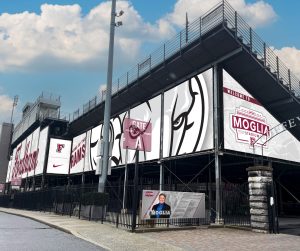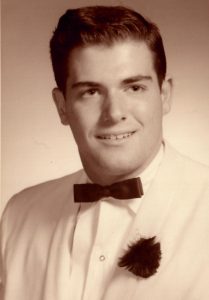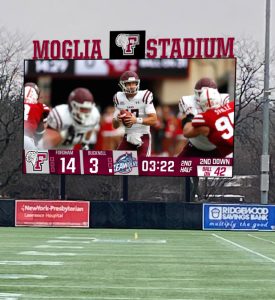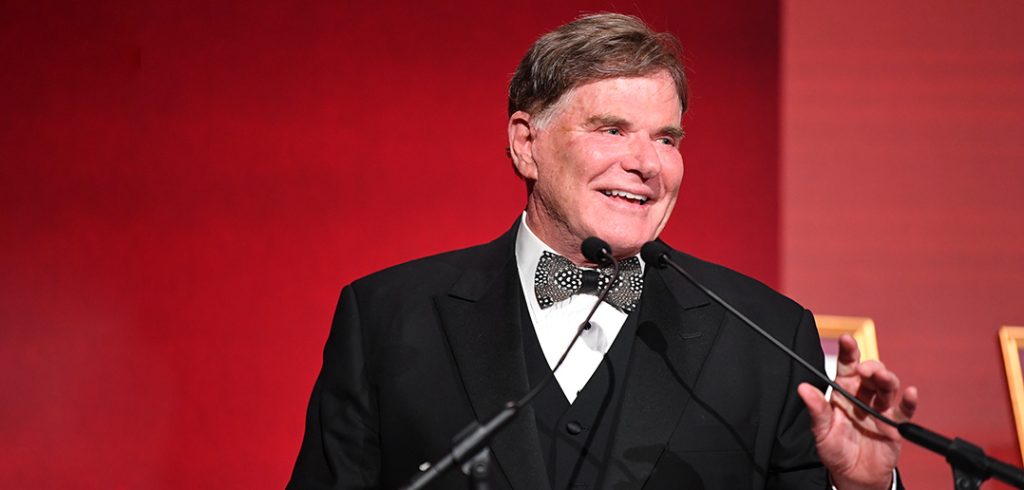Moglia, an award-winning football coach and transformational business executive, is just the fourth alumnus to be honored with the Fordham Founder’s Award as well as induction into Fordham’s Hall of Honor and its Athletics Hall of Fame. He is also a member of Fordham Prep’s Hall of Honor and Football Hall of Fame, and received an honorary doctorate from the University in 2009.

“Joe embodies the Fordham way,” said Tania Tetlow, Fordham’s president. “From his time as a student at the Prep, his undergrad days at Fordham University, and throughout his business and coaching career, Joe has been closely connected to Fordham and all this institution stands for. Joe has made us proud by clearly living the Fordham principles and mission. The stadium upgrades wouldn’t be possible without Joe’s continued generosity to the University. We are honored to name this stadium after him.”
Fordham will begin renovations to Moglia Stadium at Jack Coffey Field in order to make the stadium a top-tier venue for games and University events. The improved facility will feature a state-of-the-art video board, seating and press box renovations, upgraded lighting, and other improvements that help raise the profile of the University, boost recruitment, and enhance the game-day experience.
A Life of Leadership on the Field and in the Boardroom
A son of immigrants who grew up in the Dyckman Street area at the northern end of Manhattan, Moglia played football and baseball for four years at Fordham Prep before attending Fordham College at Rose Hill.
“I loved and always appreciated the education I got from Fordham,” Moglia said, citing its Jesuit approach as well as the many strong friendships he formed via the University and the Prep. “I’m proud to have been able to have a positive impact on the lives of others, and that all traces back to Fordham. A big part of whatever success I’ve achieved across two career paths is because of the education that I received there.”
When Joe began at Fordham, he was already a husband and father, and completely responsible for his education. He funded those expenses by driving a yellow taxi cab and a truck for the United States Postal Service. He also worked in his father’s fruit store, all the while carrying a full course load at Rose Hill. Due to his responsibilities, Moglia wasn’t able to be part of the Rams football team, but it was at Fordham that he began his football coaching career as an assistant at Fordham Prep.

His coaching experience and the education he received at both the Prep and the University were formative for him, leading him to formulate, at age 21, his leadership philosophy – BAM – which defines the principles of a leader: standing on one’s own two feet, taking responsibility for oneself, treating others with dignity and respect, and accepting the consequences of one’s actions.
This philosophy, he said, “dealt with everything: The idea of spiritual soundness, really knowing who you are so you can make better decisions under stress; courage, the guts to do what you really believe is right; love, the recognition that leadership is not about you, it’s about the well-being of others; and the ability to adapt and adjust when things are not going particularly well.”
This philosophy guided him in his one-of-a-kind career as a winning head college football coach and successful Wall Street executive, he said. He coached high school and college football after graduating from Fordham and went to work on Wall Street in 1984, at Merrill Lynch, and eventually became CEO and board chairman of TD Ameritrade.
When he stepped down as CEO from TD Ameritrade in 2008, shareholders had enjoyed a 500% return. Joe stayed on as chairman of the TD Ameritrade board through 2020 when the firm was acquired by Charles Schwab. When the deal was announced, the combined company was worth $100 billion and had client assets of $7 trillion; when Moglia first arrived, these numbers were $700 million and $24 billion.
After stepping down as CEO of TD Ameritrade, Moglia decided to go back to football as a Division I head coach. In 2012, Moglia was named head football coach at Coastal Carolina University. In his last 11 years as a college football coach, Joe was part of eight championship teams and received the Eddie Robinson National Coach of the Year Award and the Lombardi Award. He was also inducted into 10 Halls of Fame, including the Vince Lombardi Hall of Fame, named for the 1937 Fordham alumnus. Moglia now serves as chair of athletics and is an advisor to Coastal Carolina University President Michael T. Benson.
Moglia Stadium
Moglia Stadium is part of a complex at the Bronx campus that includes Jack Coffey Field—the playing field for football and soccer—as well as Houlihan Park, the University’s baseball venue. The renovations will be a “game changer” because of the importance of the stadium as “a central theater of school spirit and school pride—internally on campus, externally in New York City and the tri-state area, and also for our alumni base,” said Fordham’s director of athletics, Ed Kull. The benefits of the stadium upgrades will extend not only to football and other sports but also to Fordham Prep, which uses University facilities as part of athletics collaborations, Kull said.

The stadium improvements also include new connections with a video control room in the Lombardi Center that, when completed, will be used to livestream all home athletics events and provide a training ground for WFUV student announcers and other students interested in broadcasting.
A new digital scoreboard and VIP viewing box are planned, along with other seating improvements.
The project will build on other recent enhancements like new offices for the football program, also supported by University benefactors. The stadium upgrades will help Fordham achieve parity with the stadiums at competitor schools and boost recruitment, “the lifeblood of the program,” aiding the program in its goal of once again reaching the NCAA Football Championship Subdivision (FCS) playoffs every year, said Joe Conlin, head football coach.
Kull said the football program tries—successfully—to recruit student-athletes who can be academic achievers at Fordham. Conlin also noted the team’s many community service efforts, such as visiting children in elementary and middle schools and working with Team IMPACT, a nonprofit that supports children living with serious illness or disability.
The revamped stadium will reflect “the class of institution that Fordham is,” Conlin said. “We should have a great game-day experience. We should have a great stadium. It’s a fantastic school and we have a fantastic fan base, and we have the best tailgate in FCS football, so the stadium should match that.”


